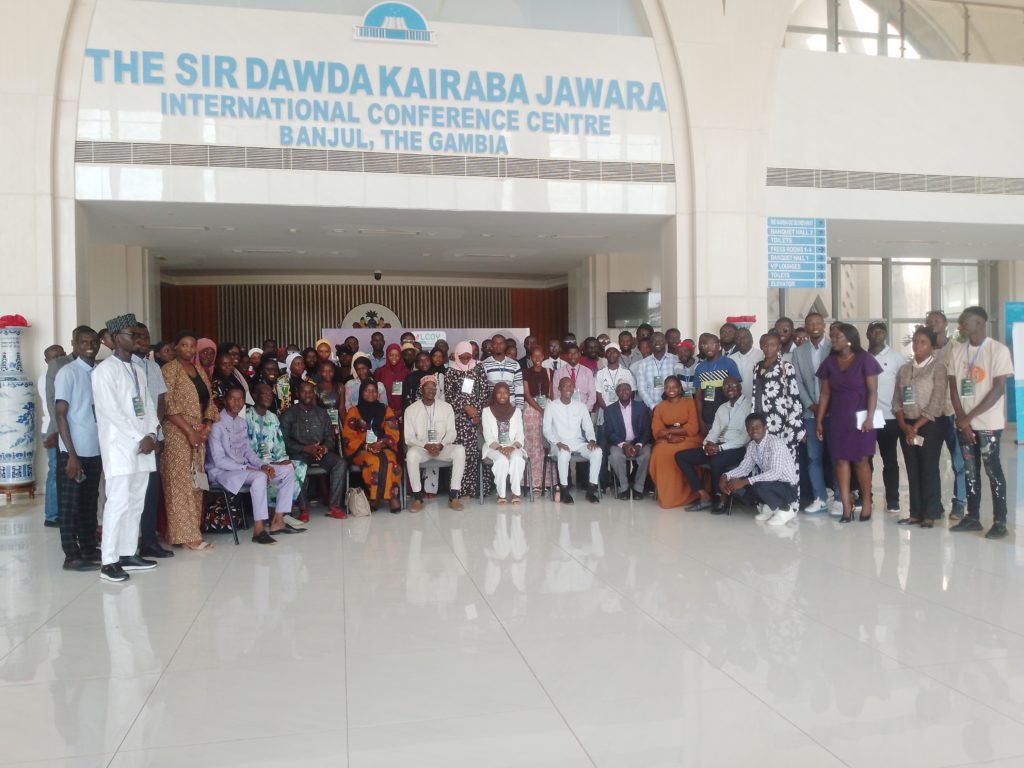Gambia Environmentalists Held 2nd Local Conference of Youth on Climate Change

By Landing Ceesay
The Gambia Environmentalists held the second edition of the Local Conference of Youth on Climate Change (LCOY The Gambia 2023) at Sir Dawda Kairaba Jawara Conference Center on Saturday.
The event aims to create a platform for youth, policymakers, development partners, and other stakeholders to discuss climate change in The Gambia and develop a path forward.
LCOY The Gambia Coordinator Dawda Cham said that The Gambia is not immune to the effects of climate change, which are evident in rising temperatures, unpredictable rainfall patterns, and sea-level rise.
Cham highlighted the importance of youth engagement in climate action, noting that they are the most vulnerable to its impacts and play a vital role in finding solutions.
“As we gather here, I implore you to remember the harsh realities our fellow Gambians experience daily. Our farmers struggle to adapt to changing weather patterns, our coastal communities are threatened by erosion, and our biodiversity is at risk. These challenges are not abstract; they affect our lives and our future.
“For instance, the low precipitations and irregular rains in the farming communities have hampered agricultural productivity, leaving many families in dire straits. Furthermore, the coastal villages of Kartong and Tanji are gradually being devoured by the relentless sea, displacing their residents. These are the current realities that our people are faced with, and I hope that by the end of this conference, we will be able to provide solutions to these pressing issues,” Mr. Cham said.
Mr. Cham emphasized the critical importance of youth involvement in climate action, citing their creativity, passion, and relentlessness as their greatest strengths.
The Young Climate Activists highlighted the central role of youth in grassroots initiatives, innovative solutions, and advocacy efforts, affirming their collective power as catalysts for change.
“It’s equally essential to acknowledge the critical role of our government in shaping our national climate policy. We appreciate the steps taken so far and implore them to continue and expand their efforts. Our government is a key player in addressing climate challenges through policy development, resource allocation, and international cooperation. That said, collaboration between the government and young people is the cornerstone of an effective climate action plan. We must be willing to engage, provide innovative solutions, and actively participate in the decision-making processes,” he said.
Mr. Bubacarr Zaidi Jallow, Deputy Permanent Secretary at the Ministry of Environment, Climate Change and Natural Resources, hailed the Gambian youth for organizing such a convergence.
Mr. Jallow said the contributions of young people towards enhancing capacity among Gambian youth and society in general to enable accelerated climate action is quite commendable.
“We as a Government are therefore fully committed to supporting in building the capacity of young climate change enthusiasts and environmentalists in the areas of environmental management, climate adaptation and mitigation, project development, and negotiations. As already mentioned, The Gambia is anticipating increased frequency and intensity of climatic impacts and disasters.
“It is therefore imperative to not haphazardly implement actions which could lead to maladaptation but to ensure the sustainability and climate friendliness of our actions, through learning and understanding global agreements, our national policies and concrete adaptation and mitigation best practices. Organizing convergences such as this important workshop is also important, with the purpose of this event being the sensitization and development of a National Youth Statement,” DPS Jallow said.
DPS Jallow said that the biggest takeaways from the conference are the knowledge and experience shared by the speakers and the realization that all stakeholders must take responsibility for their actions towards the environment in order for the Gambia to make sustained climate action a reality.
He emphasized the need for a “whole of society approach” that includes everyone, including women, men, people with disabilities, and young people, and that requires the concerted efforts of all stakeholders, including government, the private sector, and civil society organizations.
“As a Ministry, we are fully dedicated to working with youths and CSOs towards achieving our national goals with regard to climate change. I would like to remind you that you might be youthful today, but amongst you are the leaders of tomorrow, and any sound intervention that aims for sustainability must include youths. As youths, you have a lot to be grateful for, due to the rapid dissemination of information afforded to us by current technology, the current generation is more environmentally enlightened than past generations,” he said.
Haddijatou Ceesay, Leader of the LCOY Programs Working Group, said that young people are contributing to climate action through education and climate action initiatives. They are also building capacity on climate change and sensitizing vulnerable groups whose stories are often overlooked.
Ceesay emphasized the importance of the ecosystem, which provides numerous services that the Gambia cannot afford to lose.
“Additionally, the continuous supply of environmental services and goods is threatened by increasing pressures on the fragile natural resources. Climate change effects are predicted to greatly exacerbate environmental and socio-economic problems, forcing vulnerable groups to migrate, most especially women and children.
“These effects are predicted to worsen in the future. Considering the reliance of the rural population in the Gambia on rain-fed agriculture, fishing, and natural resources, these climate-related effects will continue to increase the vulnerability of local communities to climate change. For us to make Climate Action a reality, young people should be given a chance to take an active part in the decision-making process on local, national, and global levels on issues concerning climate change as we’re advocating for a sustainable future for all,” she told the gathering.

